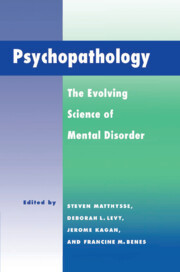Book contents
- Frontmatter
- Contents
- List of Contributors
- Preface
- Brain mechanisms
- Development
- 7 Editor's introduction: Methods in the developmental study of madness
- 8 Developmental psychopathology: From attribution toward information
- Comments on Sheldon H. White's chapter
- 9 A paradoxical partnership: Some historical and contemporary referents linking adult schizophreniform disorder and resilient children under stress
- 10 A look at the evolution of developmental models of schizophrenia
- 11 Developmental theory: Lessons from the study of risk and psychopathology
- 12 The return of the ancients: On temperament and development
- Thinking
- Genetics
- Response and reflections
- Author index
- Subject index
11 - Developmental theory: Lessons from the study of risk and psychopathology
Published online by Cambridge University Press: 04 May 2010
- Frontmatter
- Contents
- List of Contributors
- Preface
- Brain mechanisms
- Development
- 7 Editor's introduction: Methods in the developmental study of madness
- 8 Developmental psychopathology: From attribution toward information
- Comments on Sheldon H. White's chapter
- 9 A paradoxical partnership: Some historical and contemporary referents linking adult schizophreniform disorder and resilient children under stress
- 10 A look at the evolution of developmental models of schizophrenia
- 11 Developmental theory: Lessons from the study of risk and psychopathology
- 12 The return of the ancients: On temperament and development
- Thinking
- Genetics
- Response and reflections
- Author index
- Subject index
Summary
Ever since my graduate school years, I have been passionately interested in unraveling the mysteries underlying the relation between normality and pathology, and in reducing the dualisms that exist between the clinical study of and research into childhood and adult high-risk conditions and disorders, between the behavioral and the biological sciences, between developmental psychology and psychopathology, and between basic and applied research. Thus, although no such field of specialization was present at the time, I vowed to commit myself to embarking on a career with these goals in mind. The field of developmental psychopathology has been my chosen pathway in clarifying and pursuing these aims.
Since adopting this philosophy, my goal has been to work toward the formulation of an integrative theory of development that charts the interrelations among the biological, psychological, and social domains across the life course. I have tried to accomplish this by focusing both on clinical and nonclinical populations of children and adults, because I firmly believe that not only must we know how normal development proceeds before we can truly understand psychopathology, but also that in investigating pathology we gain insight into the processes and mechanisms underlying typical forms of ontogenesis (Cicchetti, 1984b, 1990; Rutter, 1986).
In the decade since the publication of the Special Issue on Developmental Psychopathology in Child Development (Cicchetti, 1984a), major progress has occurred and developmental psychopathology is now viewed as an emergent scientific disciptti, 1989).
- Type
- Chapter
- Information
- PsychopathologyThe Evolving Science of Mental Disorder, pp. 253 - 284Publisher: Cambridge University PressPrint publication year: 1996
- 6
- Cited by



